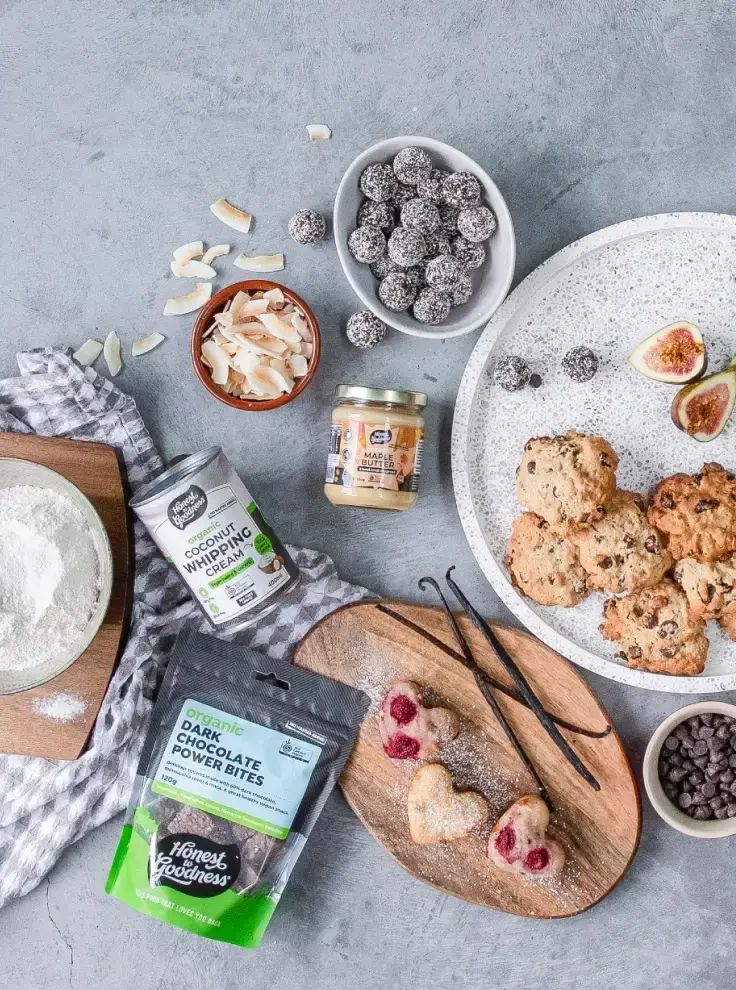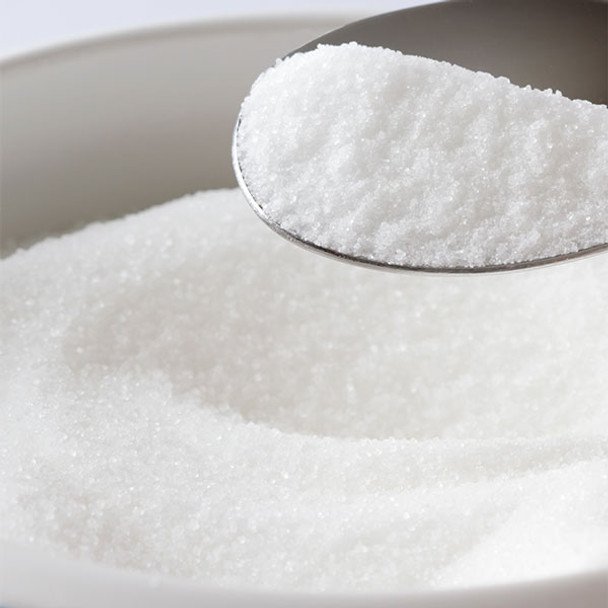Xylitol is a simple to use, lower-calorie sugar substitute with a low glycaemic index (GI) and sweet taste. With a low GI of 7, it provides a healthier option for those looking to reduce their sugar intake without compromising on taste.
Using Xylitol as a sugar substitute is quite straightforward as it can be used in many of the same ways as regular sugar. It looks and tastes the same to sugar and is interchangeable in recipes - the only difference is a possible, subtle minty aftertaste. Xylitol can generally be substituted for sugar at a 1:1 ratio in most recipes. Check out our ‘how to use’ tab for ideas on how to use Xylitol.
Xylitol contains 40% less calories than cane sugar, is low GI, non-GMO and is 100% natural. Our Xylitol is carefully processed to ensure the highest quality and purity.
Caution: Excessive consumption may have a laxative effect.
It is worth noting that Xylitol can be toxic to dogs and other pets. It is vital to store products containing Xylitol in a safe place that pets cannot reach and do not feed your furry friends food made with Xylitol.
Storage: Because Xylitol absorbs moisture, keep it tightly sealed to prevent it from clumping or becoming sticky.
HOW TO USE
Xylitol can be used in a variety of ways:
Baking: Substitute Xylitol (1:1) for sugar in your favourite baking recipes for a healthier treat (as in 1/2 cup sugar equals 1/2 cup Xylitol). Use Xylitol in biscuits, cakes, muffins, and other baked goods. Note that it doesn't caramelise or brown as sugar does, which may affect the appearance and texture of some recipes.
Beverages: Sweeten your coffee, tea or smoothies with Xylitol for a guilt-free indulgence. It dissolves well in both hot and cold liquids.
Cooking: Use Xylitol in sauces, dressings and marinades for a touch of sweetness without the extra calories. It can be used in making jams and preserves, although the texture may vary slightly compared to those made with regular sugar.
Snacks and Desserts: Add Xylitol to homemade granola, energy bars and balls, or sprinkle on yoghurt and desserts. A few tips when using Xylitol…
Moisture Absorption: Xylitol does have hygroscopic properties, meaning it absorbs moisture from the environment. This can affect the texture of baked goods, keeping them moist for longer periods. Xylitol's moisture-retaining properties might require adjustments in recipes to achieve the desired texture.
Yeast Fermentation: Xylitol does not provide the same food source for yeast as sugar does. Yeast ferments sugar to produce carbon dioxide, which helps dough rise. Xylitol cannot be fermented by yeast, so it won't contribute to the leavening process in yeast-based recipes.
GROWING & PROCESSING
Xylitol is typically derived from plant sources such as corn cobs or birch wood. This Xylitol is derived from non-GMO Birch. It is carefully processed to ensure the highest quality and purity.
Whilst Xylitol can be produced from different sources, the end product, Xylitol itself, is chemically the same. However, there are some differences in the sourcing and production processes and reasons why to choose one over the other.
Xylitol from corn is derived from the fibrous part of corn. Carefully choose your brand to ensure the corn is GMO free. Corn is widely available and abundant, ensuring a steady supply of raw materials. Xylitol from corn is usually less expensive to produce, making it more affordable for consumers and generally considered to have a lower environmental impact in terms of cultivation and harvest.
Xylitol from birch is extracted from the bark of birch trees. Birch trees take longer to grow and harvesting birch for xylitol production may have a higher environmental impact (it also may not). Sustainable forestry practices are necessary to ensure minimal ecological disruption. Xylitol from birch is generally more expensive to produce due to the sourcing and extraction process, making it a pricier option for consumers.
Birch-derived Xylitol has a longer history of use and is often perceived as more "natural" or traditional, though this is largely a matter of consumer perception. Both corn-based and birch-based Xylitol are chemically identical and offer the same sweetness and health benefits. The quality of Xylitol does not depend on the source but rather on the purity and the production process. Our Xylitol is carefully processed to ensure the highest quality and purity. Enjoy!
INGREDIENTS
Xylitol








Xylitol is a simple to use, lower-calorie sugar substitute with a low glycaemic index (GI) and sweet taste. With a low GI of 7, it provides a healthier option for those looking to reduce their sugar intake without compromising on taste.
Using Xylitol as a sugar substitute is quite straightforward as it can be used in many of the same ways as regular sugar. It looks and tastes the same to sugar and is interchangeable in recipes - the only difference is a possible, subtle minty aftertaste. Xylitol can generally be substituted for sugar at a 1:1 ratio in most recipes. Check out our ‘how to use’ tab for ideas on how to use Xylitol.
Xylitol contains 40% less calories than cane sugar, is low GI, non-GMO and is 100% natural. Our Xylitol is carefully processed to ensure the highest quality and purity.
Caution: Excessive consumption may have a laxative effect.
It is worth noting that Xylitol can be toxic to dogs and other pets. It is vital to store products containing Xylitol in a safe place that pets cannot reach and do not feed your furry friends food made with Xylitol.
Storage: Because Xylitol absorbs moisture, keep it tightly sealed to prevent it from clumping or becoming sticky.
HOW TO USE
Xylitol can be used in a variety of ways:
Baking: Substitute Xylitol (1:1) for sugar in your favourite baking recipes for a healthier treat (as in 1/2 cup sugar equals 1/2 cup Xylitol). Use Xylitol in biscuits, cakes, muffins, and other baked goods. Note that it doesn't caramelise or brown as sugar does, which may affect the appearance and texture of some recipes.
Beverages: Sweeten your coffee, tea or smoothies with Xylitol for a guilt-free indulgence. It dissolves well in both hot and cold liquids.
Cooking: Use Xylitol in sauces, dressings and marinades for a touch of sweetness without the extra calories. It can be used in making jams and preserves, although the texture may vary slightly compared to those made with regular sugar.
Snacks and Desserts: Add Xylitol to homemade granola, energy bars and balls, or sprinkle on yoghurt and desserts. A few tips when using Xylitol…
Moisture Absorption: Xylitol does have hygroscopic properties, meaning it absorbs moisture from the environment. This can affect the texture of baked goods, keeping them moist for longer periods. Xylitol's moisture-retaining properties might require adjustments in recipes to achieve the desired texture.
Yeast Fermentation: Xylitol does not provide the same food source for yeast as sugar does. Yeast ferments sugar to produce carbon dioxide, which helps dough rise. Xylitol cannot be fermented by yeast, so it won't contribute to the leavening process in yeast-based recipes.
GROWING & PROCESSING
Xylitol is typically derived from plant sources such as corn cobs or birch wood. This Xylitol is derived from non-GMO Birch. It is carefully processed to ensure the highest quality and purity.
Whilst Xylitol can be produced from different sources, the end product, Xylitol itself, is chemically the same. However, there are some differences in the sourcing and production processes and reasons why to choose one over the other.
Xylitol from corn is derived from the fibrous part of corn. Carefully choose your brand to ensure the corn is GMO free. Corn is widely available and abundant, ensuring a steady supply of raw materials. Xylitol from corn is usually less expensive to produce, making it more affordable for consumers and generally considered to have a lower environmental impact in terms of cultivation and harvest.
Xylitol from birch is extracted from the bark of birch trees. Birch trees take longer to grow and harvesting birch for xylitol production may have a higher environmental impact (it also may not). Sustainable forestry practices are necessary to ensure minimal ecological disruption. Xylitol from birch is generally more expensive to produce due to the sourcing and extraction process, making it a pricier option for consumers.
Birch-derived Xylitol has a longer history of use and is often perceived as more "natural" or traditional, though this is largely a matter of consumer perception. Both corn-based and birch-based Xylitol are chemically identical and offer the same sweetness and health benefits. The quality of Xylitol does not depend on the source but rather on the purity and the production process. Our Xylitol is carefully processed to ensure the highest quality and purity. Enjoy!
INGREDIENTS
Xylitol














 Honest to Goodness
Honest to Goodness





